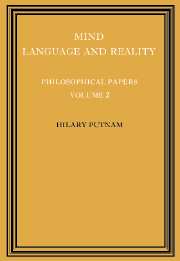Book contents
- Frontmatter
- Contents
- Dedication
- Introduction
- 1 Language and philosophy
- 2 The analytic and the synthetic
- 3 Do true assertions correspond to reality?
- 4 Some issues in the theory of grammar
- 5 The ‘innateness hypothesis’ and explanatory models in linguistics
- 6 How not to talk about meaning
- 7 Review ofThe concept of a person
- 8 Is semantics possible?
- 9 The refutation of conventionalism
- 10 Reply to Gerald Massey
- 11 Explanation and reference
- 12 The meaning of ‘meaning’
- 13 Language and reality
- 14 Philosophy and our mental life
- 15 Dreaming and ‘depth grammar’
- 16 Brains and behavior
- 17 Other minds
- 18 Minds and machines
- 19 Robots: machines or artificially created life?
- 20 The mental life of some machines
- 21 The nature of mental states
- 22 Logical positivism and the philosophy of mind
- Bibliography
- Index
20 - The mental life of some machines
Published online by Cambridge University Press: 12 January 2010
- Frontmatter
- Contents
- Dedication
- Introduction
- 1 Language and philosophy
- 2 The analytic and the synthetic
- 3 Do true assertions correspond to reality?
- 4 Some issues in the theory of grammar
- 5 The ‘innateness hypothesis’ and explanatory models in linguistics
- 6 How not to talk about meaning
- 7 Review ofThe concept of a person
- 8 Is semantics possible?
- 9 The refutation of conventionalism
- 10 Reply to Gerald Massey
- 11 Explanation and reference
- 12 The meaning of ‘meaning’
- 13 Language and reality
- 14 Philosophy and our mental life
- 15 Dreaming and ‘depth grammar’
- 16 Brains and behavior
- 17 Other minds
- 18 Minds and machines
- 19 Robots: machines or artificially created life?
- 20 The mental life of some machines
- 21 The nature of mental states
- 22 Logical positivism and the philosophy of mind
- Bibliography
- Index
Summary
In this paper I want to discuss the nature of various ‘mentalistic’ notions in terms of a machine analog. In chapter 18, I tried to show that the conceptual issues surrounding the traditional mind–body problem have nothing to do with the supposedly special character of human subjective experience, but arise for any computing system of a certain kind of richness and complexity, in particular for any computing system able to construct theories concerning its own nature. In that paper I was primarily interested in the issues having to do with mind–body identity. In the present paper the focus will be rather in trying to shed light on the character of such notions as preferring, believing, feeling. I hope to show by considering the use of these words in connection with a machine analog that the traditional alternatives – materialism, dualism, logical behaviorism – are incorrect, even in the case of these machines. My objectives are not merely destructive ones; I hope by indicating what the character of these words is in the case of the machine analog to suggest to some extent what their character is in application to human beings.
One question which I shall not discuss, except for these remarks at the outset, is the question to what extent the application of such terms as ‘preference’ to Turing Machines represents a change or extension of meaning.
- Type
- Chapter
- Information
- Philosophical Papers , pp. 408 - 428Publisher: Cambridge University PressPrint publication year: 1975
- 47
- Cited by



